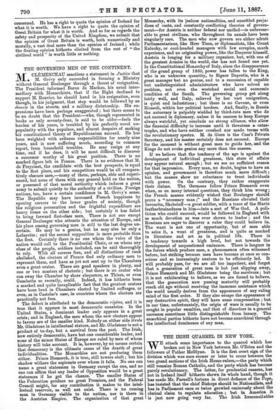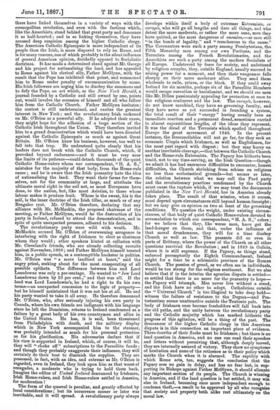THE IRISH QUARREL IN NEW YORK.
WE attach some importance to the quarrel which has broken out in New York between Mr. O'Brien and the followers of Father McGlynn. It is the first overt sign of the division which was sure sooner or later to occur between the two grand sections of the Irish Home-rulers,—the party which still remains Roman Catholic, and the party which has become purely revolutionary. The latter, for prudential reasons, has not in Ireland itself hitherto shown its whole hand, though it has made Mr. Parnell's fortune in direct defiance of the Pope, has insisted that the chief Bishops should be Nationalists, and has in Parliament once or twice growled ominously about the clerical claim to regulate education ; but in America it is just now going very far. The Irish Irreconoilables there have linked themselves in a variety of ways with the cosmopolitan revolution, and even with the factions which, like the Anarchists, stand behind that great party and denounce it as half-hearted ; and in so linking themselves, they have aroused deep suspicion among the higher Catholic clergy. The American Catholic Episcopate is snore independent of its people than the Irish, is more disposed to rely on Rome, and is for many reasons, one of which probably is the silent influence of general American opinion, decidedly opposed to Socialistic doctrines. It has made a determined stand against Mr. George and his project for nationalising the land, and has appealed to Rome against his clerical ally, Father McGlynn, with the result that the Pope has inhibited that priest, and summoned him to Rome under penalty of excommunication by name. His Irish followers are urging him to disobey the summons and to defy the Pope, an act which, as the New York Herald, a journal founded by a Catholic and still owned by one, points out, would involve the secession of himself and all who follow him from the Catholic Church. Father McGlynn hesitates ; the contest is still undetermined, and excites the greatest interest in New York ; and the revolutionary Irish reckoned on Mr. O'Brien as a powerful ally. If he adopted their cause, they might hope for the adhesion of a large section of the Catholic Irish throughout the Union. They therefore invited him to a grand demonstration which would have been directed against the Catholic Episcopate as much as against Great Britain. Mr. O'Brien knew his business, however, too well to fall into that trap. He understood quite clearly that his leaders dare not break with the Catholic Church, which, if provoked beyond endurance—and it must be very near the limits of its patience—could detach thousands of the quiet Catholic Home-riders whom our correspondent, "H. A. S.," mistakes for the majority of that body, from the Home-rule cause ; and he is aware that the Irish peasantry hate the idea of nationalising the land. They want their farms for them- selves, not for the community at large, and attribute the ultimate moral right in the soil not, as most Europeans have done, to the nation, but, like most Asiatics, to those whose labour makes it produce fruit. Whose is the sweat, his is the soil, is the inner doctrine of the Irish tiller, as much as of any Bengalee ryot. Mr. O'Brien therefore, declaring that any alliance with Mr. McMackin, the proposed chairman of the meeting, or Father McGlynn, would be the destruction of his party in Ireland, refused to attend the demonstration, and in spite of quite unexpected pressure, adhered to his decision.
The revolutionary party were wild with wrath. Mr. McMackin accused Mr. O'Brien of overweening arrogance in interfering with the right of Irishmen to elect as chairman whom they would ; other speakers hinted at collusion with Mr. Cleveland's friends, who are already collecting recruits against November, 1888; and Father McGlynn himself treated him, in a public speech, as a contemptible huckster in politics. Mr. O'Brien was "a mere landlord at heart," said the angry priest, seeking about for the most exasperating of all possible epithets. The difference between him and Lord Lansdowne was only a per-centage. He wanted to "Jew Lord Lansdowne down by 10 per cent.," and that was all. If the land was Lord Lansdowne's, he had a right to fix his own terms—an unexpected concession to the logic of property— but he himself maintained that it was not his at all. He and his party wanted to take it all away. He therefore denounced Mr. O'Brien, who, after seriously injuring his own party in Canada, where his own friends are indignant with his language since he left the Dominion, returns to Ireland condemned as a failure by a great body of his own countrymen and allies in the United States. He has, it is said, been threatened from Philadelphia with death, and the military display which in New York accompanied him to the steamer, was probably intended as much for his personal protection as for his glorification. His adversaries declare that if his view is supported in Ireland, which, of course, it will be, they will "choke off" subscriptions to the Parnellite funds ; and though they probably exaggerate their influence, they will certainly do their best to diminish the supplies. They are possessed, in fact, with an idea, and extreme as Mr. O'Brien is regarded, even in Ireland, they look upon him as that worst of renegades, a moderate who is trying to hold them back. Imagine the editor of United Ireland denounced by Irishmen, Irish Home-rulers, and frill Home-rulers settled in America, for moderation I
The form of the quarrel is peculiar, and greatly affected by local considerations ; but its occurrence sooner or later was inevitable, and it will spread. A revolutionary party always
develops within itself a body of extremer Extremists, or enrages, who will go all lengths and dare all things, and who detest the more moderate, or rather the more sane, men they have quitted, as the most dangerous of enemies,—as men still "in the bonds of legality," and "treacherous to the cause." The Covenanters were such a party among Presbyterians, the Fifth Monarchy men among our own Puritans, and the Terrorists among the French Revolutionaries, and the Anarchists are such a party among the modern Socialists of all Europe. Undeterred by fears for society, and unfettered by religious scruples, they, outside England, usually succeed in seizing power for a moment, and then their vengeance falls sharply on their more moderate allies. They send them wholesale to exile, prison, or the block. If they could sway Ireland for six months, perhaps six of the Pamela° Members would escape execution or banishment, and we should see men like Mr. Dillon passionately appealing for protection at once to the religious sentiment and the law. The enrages, however, do not know mankind, they have no governing faculty, and they have never as yet succeeded in founding a system, the total result of their " energy " having usually been an immediate reaction and a permanent dread, sometimes carried to almost superstitions lengths, of the ideas they represent. It was the dread of the Terrorists which spoiled throughout Europe the great movement of 1848. In the present instance, the Irreconcilables will not go far, for they seek an economic Utopia which Irishmen, as well as Englishmen, for the most part regard with disgust ; but they may hurry on another inevitable cleavage,—that between the Catholic Church and the Home-rule Extremists. The Papacy has hitherto been timid, not to say time-serving, on the Irish Question—though we admit it has had enormous difficulties to encounter, honest difficulties, the Church shrinking from schism on religious no less than ecclesiastical grounds—but sooner or later, the relation between what we may call the Ford party and the revolutionary practices condemned by the Church must cause the rupture which, if we may trust the documents published in the New York Herald, has in America already taken place. The result of that scission, when it occurs, must depend upon circumstances still beyond human foresight; but we may give an opinion on two at least of the governing conditions. We question the weight, under existing circum- stances, of that body of quiet Catholic Home-rulers devoted to accumulation to which our correspondent, "H. A. S.," refers ; for we believe that they, like worse men, have got the land-hunger on them, and that, under the influence of that moral drunkenness, they will for a time disobey Church as well as law. The peasants did so even in parts of Brittany, where the power of the Church on all other questions survived the Revolution ; and in 1849 in Galicia, where it is still supreme. If the Papacy, as things stand, enforced peremptorily the Eighth Commandment, Ireland might for a time be a schismatic province of the Roman Church. The passion of greed, as we often see in individuals, would be too strong for the religious sentiment. But we also believe that if in the interim the agrarian dispute is settled— so settled that there is no more for the peasantry to hope— the Papacy will triumph. Men never live without a creed, and the Irish have no other to adopt. Catholicism outside the "Universal Church" is too illogical to take deep hold— witness the failure of resistance to the Dogma—and Pro- testantism seems unattractive outside the Teutonic pale. The body of Irishmen once become freeholders will fall back into the old paths, and the unity between the revolutionary party and the Catholic majority which has marked hitherto the progress of this agitation, will be a thing of the past. The demeanour of the higher Catholic clergy in this American dispute is in this connection an important piece of evidence. Three-fourths of their flocks must be Irishmen; but there is no land question in America, and no one can read their speeches and letters without perceiving that, although deeply moved, they are internally assured of victory. They show no symptoms of hesitation and none of the reticence as to their policy which marks the Church when it is alarmed. The rapidity with which Rome acts, too, suggests the conclusion that the Papacy sees no gain in delay, and has no fear lest, in sup- porting its Bishops against Father McGlynn, it should alienate any important section of its people. The Church is winning in America, and if the land question is but settled, it may win also in Ireland, becoming once more independent enough to condemn theft,—a result to be approved by all who recognas. e that society and property both alike rest ultimately on the moral law.



































 Previous page
Previous page